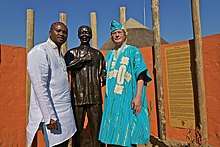Imbongi
The imbongi (plural izibongo) or Xhosa praise poet is a distinct member of the Xhosa community and serves a number of significant social functions. The ‘imbongi’ is sometimes described as ‘the poet who walks before any great chief’ as they are often part of the welcoming of royalty. The ‘imbongi is traditionally male and recites poems which inspire emotions, record clan and family relationships, alludes to historical events and comments on current affairs.
History
The earliest written records of ‘’imbongi’’ were recorded by the Methodist missionary James Whitworth who noted in his journal entry for 6 April 1825 while visiting Gcaleka king Hintsa: ‘'At sunset a man proclaimed aloud the transactions of the day, which seems to be the usual custom, ending with 'Our Captain is a great Captain. When the white men came to see him, he received them kindly, and gave them an ox to eat’'
.png)
The imbongi draws his poetic inspiration from his own ancestors when appropriate; however, when praising the chief, the poetry includes references to the praise names of the chief and the chief's ancestors. In this way the imbongi draws the sympathetic attention of the royal ancestors to the prosperity of the nation.[1]
Mine ‘imbongi’
During the mining era in South Africa, a different type of imbongi emerged; however, this type of praise signer no longer exists. The difference between the ‘home’ and ‘mine’ imbongi was that the mine imbongi had no degree of prominence as they were also primarily miners. The activities of the mining imbongi were largely informal and unofficial. However, miners reported that the mine imbongi reinforced rules of the mine, discouraged violence, crime and excessive materialism. In this manner, the mining imbongi supported social harmony and reiterated norms and values. Another role of this imbongi was to reinforce traditionalist norms in keeping with Xhosa tradition and culture.[2]
Purpose
It is believed that the poetry from ‘izibongo’ (plural) has power by invoking the names of departed ancestors. He is able to conjure their presence and facilitate communication between the living and the dead. The ceremonial praises of the imbongi ensure the beneficent attention of the departed royal ancestors to the ruling king and through him to the kingdom as a whole. The Xhosa imbongi is not an entertainer, nor is he limited to the performing poetry for the royal family.[3]The imbongi is allowed to criticize communities, use suggestive language and make outrageous statements which are normally regarded as unacceptable for the average Xhosa man. It is considered shameful to kill an imbongi in battle, even if he is aggravating the soldiers. The imbong’s performance style is generally aggressive and intimidating in performance, this includes brandishing spears, or fighting sticks and occasionally hurling spears into the ground to agitate the ancestors.[4]
Characteristics
Izibongo (plural) are often cryptic and refer to circumstances or qualities in compressed, often metaphoric allusions. They are characteristically comparable to the court jester in European literature.Although the izibongo’s emotional performances are normally an important aspect of political ritual, the imbongi can, on occasion, deliberately puzzle his audience, making outrageous claims, or using obscene language.[5]
The Xhosa imbongi is associated with the chief or king often as a member of the royal entourage. On significant public and ritual occasions he produces poems in praise of the chief, referring to his lineage, his qualities, and actions, commenting on the social or political context of the performance. In the normal course of events, in the absence of royalty, he performs for his community on a regular basis.[6]
Gender
The majority of izibongo are male performers but men, women and children have been seen performing the role of the imbongi. However, only men dress in the traditional garments of an imbongi and perform during ceremonial occasions. In 2015, 74 year old Kgato Masemola became first female praise singer to be given the honour of heralding the arrival of then Jacob Zuma in Parliament before the president delivered his sixth State of the Nation Address (South Africa). She is Kgoshigadi (queen) Mogoshadi Marishane’s official praise poet.[7][8]
National role
The South African government has incorporated the role of the imbongi in national official events. The primary consideration made when selecting a praise poet for the president’s address is to rotate between languages to give each of South Africa’s indigenous cultures a fair representation. The parliamentary presiding officers ultimately decide who will receive the honour.[9]

See also
External links
References
- ↑ Jeff Opland. Xhosa Oral Poetry: Aspects of a Black South African Tradition. Cambridge University Press, 30 Dec 1983. Page 250-263
- ↑ Jeff Opland. Xhosa Oral Poetry: Aspects of a Black South African Tradition. Cambridge University Press, 30 Dec 1983. Page 250-263
- ↑ Jeff Opland, Patrick McAllister.The Xhosa imbongi as trickster.Journal of African Cultural Studies, Vol. 22, No. 2 (December 2010), pp. 157-167. Taylor & Francis, Ltd. https://www.jstor.org/stable/41428129 Accessed: 12-08-2018 16:57 UTC
- ↑ Jeff Opland, Patrick McAllister.The Xhosa imbongi as trickster.Journal of African Cultural Studies, Vol. 22, No. 2 (December 2010), pp. 157-167. Taylor & Francis, Ltd. https://www.jstor.org/stable/41428129 Accessed: 12-08-2018 16:57 UTC
- ↑ Jeff Opland, Patrick McAllister.The Xhosa imbongi as trickster.Journal of African Cultural Studies, Vol. 22, No. 2 (December 2010), pp. 157-167. Taylor & Francis, Ltd. https://www.jstor.org/stable/41428129 Accessed: 12-08-2018 16:57 UTC
- ↑ Jeff Opland, Patrick McAllister.The Xhosa imbongi as trickster.Journal of African Cultural Studies, Vol. 22, No. 2 (December 2010), pp. 157-167. Taylor & Francis, Ltd. https://www.jstor.org/stable/41428129 Accessed: 12-08-2018 16:57 UTC
- ↑ Jeff Opland, Patrick McAllister.The Xhosa imbongi as trickster.Journal of African Cultural Studies, Vol. 22, No. 2 (December 2010), pp. 157-167. Taylor & Francis, Ltd. https://www.jstor.org/stable/41428129 Accessed: 12-08-2018 16:57 UTC
- ↑ https://mg.co.za/article/2015-02-19-career-or-calling-the-changing-face-of-praise-poets&source=gmail&ust=1534178925416000&usg=AFQjCNGQ6_2qwFIiKa2vhtfBmG94Ut5ntg Accessed 12/8/2018
- ↑ Jeff Opland, Patrick McAllister.The Xhosa imbongi as trickster.Journal of African Cultural Studies, Vol. 22, No. 2 (December 2010), pp. 157-167. Taylor & Francis, Ltd. https://www.jstor.org/stable/41428129 Accessed: 12-08-2018 16:57 UTC